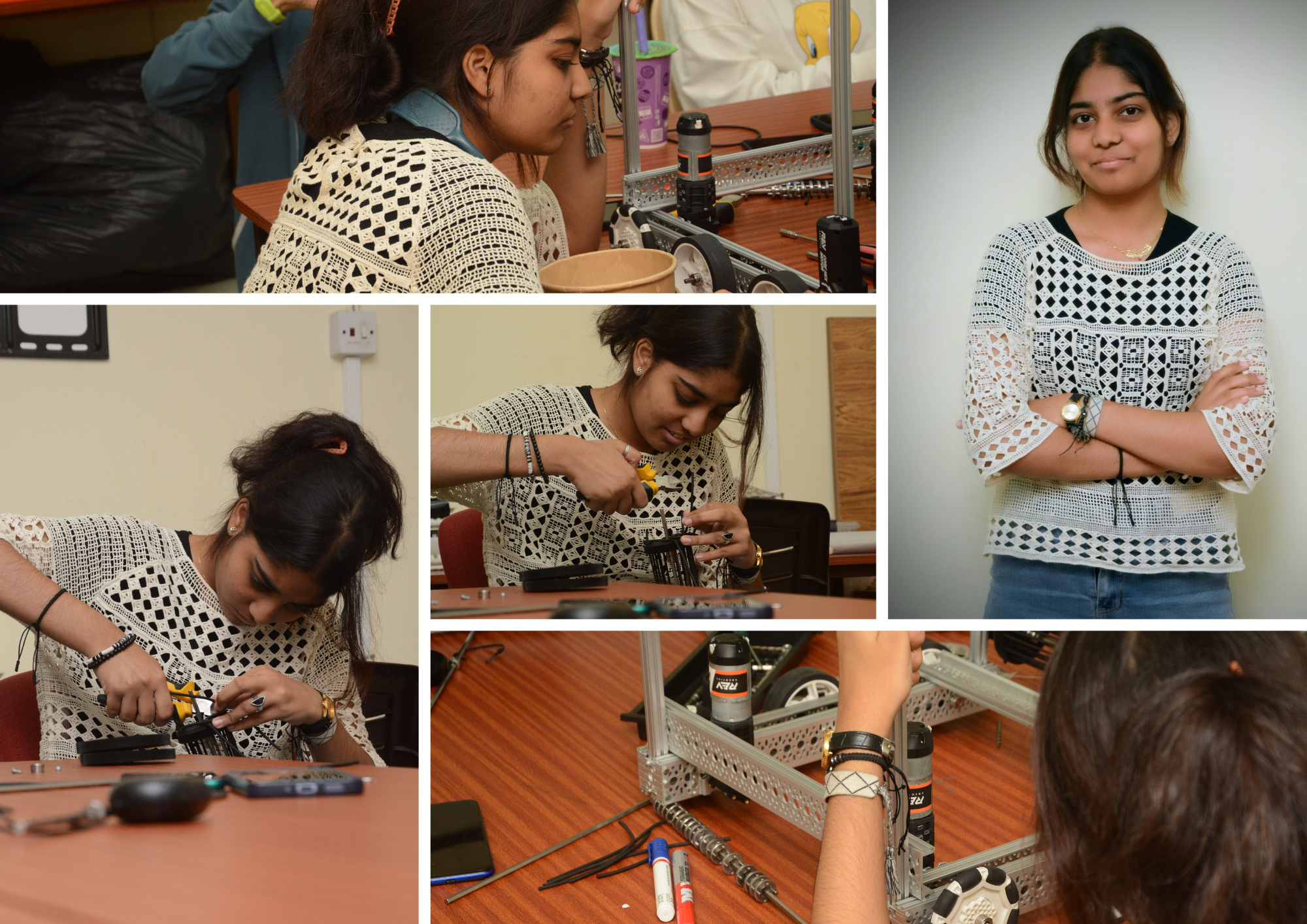This is the interview of Sajida Jomeer, one of the five students who formed part of Team Mauritius in FIRST Global 2023, Singapore.
Continue reading “Interview: Sajida Jomeer, Robotics Team Mauritius 2023”Loretto College Port Louis Student, Sajida Jomeer, Joins YUVA’s Robotics Team Mauritius for FIRST Global 2023
Sajida Jomeer, a remarkable Grade 10 student hailing from Loretto College Port Louis, has achieved a remarkable feat by securing a coveted spot in YUVA’s Robotics Team Mauritius. The team is all set to participate in the prestigious Robotics Olympics – FIRST Global 2023, hosted in Singapore.
Sajida Jomeer’s exceptional passion for robotics and innovation has been recognised by YUVA. Sajida’s journey from Loretto College to the international stage of the FIRST Global 2023 event stands as a testament to her dedication and determination.
Continue reading “Loretto College Port Louis Student, Sajida Jomeer, Joins YUVA’s Robotics Team Mauritius for FIRST Global 2023”My Internship at YUVA: A Fulfilling Experience
I had never thought I would be doing an internship at YUVA, but now that I have done it, I don’t regret it. I was impressed by the number of projects and initiatives they take to help people, especially young people. It’s nice to see an organisation committed to achieving its goals. So I didn’t hesitate to apply for an internship there.
I found out about YUVA on the Internet. I was researching internship opportunities. I finally came across the YUVA website and saw that the organisation had an internship programme, which immediately piqued my interest, and of course, I took a chance. I got a response very quickly, and it was great. At first, I wasn’t sure what to expect and if I would feel lost. But as the course progressed, I was immediately guided, and I knew right away that it would go well.
Continue reading “My Internship at YUVA: A Fulfilling Experience”My internship at YUVA: A Chosen Path Towards Growth
As a communication student currently minoring in journalism, I’m always seeking to understand my surroundings and learn to give a voice to those who need to be heard. Hence, I was looking to intern where I could focus on self-growth and discover several facets of life. I felt that YUVA could lead me on this path, and I landed up doing my internship at YUVA.
You could ask me: “Why didn’t you choose to intern elsewhere?” My answer will always be the same: “After reading about YUVA, I was deeply attached to its vision and belief.” However, I was abroad when I applied here, but I was surprised by the quick response from the executive director, Mr Krishna Athal. Usually, when looking for an internship, they have to chase after it, which can sometimes become exhausting. But this fast response stood out to me, and the internship request situation felt reciprocated. Then, I was given my first interview the next day at flexible hours, and I’m grateful that it went well.
Continue reading “My internship at YUVA: A Chosen Path Towards Growth”21 February: International Mother Language Day
Since 2000, the world has celebrated International Mother Language Day on 21 February. A language is considerably more than simply a means of communication. Language, notably the mother tongue, is a vital aspect of different cultures worldwide. International Mother Language Day aims to enhance global awareness of language, cultural diversity, and multilingualism. But what are the history and importance of this day?
According to the United Nations, languages are strategically crucial for individuals and the world due to their complex consequences for identity, communication, social integration, education, and growth. They are, unfortunately, increasingly threatened or on the verge of extinction because of globalisation. However, they are an essential part of preserving cultures all over the world.
Continue reading “21 February: International Mother Language Day”A Career in the Non-Profit Sector for Finance People
Finance is one of the most popular and sought-after career paths. With the attractive salaries and faster career growth opportunities it offers, the finance field does not lack aspiring professionals. Similarly, there is no lack of finance job openings in the private or public sector.
However, the newer generations have shown an inclination towards job fulfilment rather than financial benefits when choosing their careers. They seek more than just high salaries. Their job is an extension of their passion rather than just a way to earn money. Generations Y and Z notably hold a strong social conscience, having grown with the internet, a tool that allowed them access to understand and societal issues on a global scale. Unlike the older generations’ traditional belief to give back to society after reaching a certain level of wealth and a strong position of financial security, the younger generations believe in contributing towards society’s wellbeing through their work. We often see young graduates venturing into the non-profit sector rather than the private or public sector. Their drive to do good while earning a living pushes them towards a career in the non-profit sector.
Continue reading “A Career in the Non-Profit Sector for Finance People”The One Thing All Successful NGOs Have in Common: A Robust Financial Framework
“The ‘financial framework’ is the term for the policies, procedures, regulations and standing orders we use to make sure we’re taking proper care of public money.” – Powys County Council
Similar to a business, it is imperative to establish a robust financial framework for an NGO. A financial framework provides an organised system that guides and supports the financial operations and structure of the organisation. It includes internal financial control mechanisms to prevent financial mismanagement such as misuse or theft of funds and assets, non-compliance of an organisation or government policies and regulations, and inaccurate financial reporting. NGOs also face several problems, including inadequate resources, lack of capacity building, lack of performance measurement instruments, and inefficient management. Setting up a proper financial framework will help resolve some, if not all, of them.
Continue reading “The One Thing All Successful NGOs Have in Common: A Robust Financial Framework”Tricks on How NGOs Can Survive Without Funding
Anne Frank once wrote, “No one has ever become poor by giving”. But to give, you need to have. Every organisation needs funding to operate. Like any organisation, NGOs need money to cover their costs- capital costs, operation costs, overhead costs, staff costs, etc. NGOs, in particular, depend primarily on grants and donations for survival.
What happens when the organisation runs out of money? Donations are made at random, and grants are often subjected to conditions. With a limited budget and uncertain cash inflow, NGOs often have to curtail their spending at the cost of quantity and quality of their work. Under these circumstances, NGOs find it difficult to plan for the long term and ensure the longevity of their humanitarian programmes. Preemptively, NGOs should develop a stable funding source and steadily achieve autonomy from donor funds and grants.
Continue reading “Tricks on How NGOs Can Survive Without Funding”Social Entrepreneurship: A Catalyst for Economic Development
In this highly materialistic and turbulent world, it is no surprise that most countries are chasing economic development as a potential panacea for our social ills.
Trade wars have erupted, global resources exploited, inequality flourished, but if there is anything that has been consistently keeping up with the caprices of capitalism while fostering wellbeing, it is social entrepreneurship. Social entrepreneurs act as a major engine in the economic machine through their business activities and fuel development by raising the quality of life of the population.
Continue reading “Social Entrepreneurship: A Catalyst for Economic Development”The 5 Best Reviews of Mauritius Budget 2021/22 for SMEs
Small and medium enterprises play a massive role in our economy, whether through employment creation or social contributions or a source of tax revenue for the government.
Acknowledging their importance, the Minister made several provisions for SMEs in this year’s budget, in various sectors and different financial and non-financial ways.
Continue reading “The 5 Best Reviews of Mauritius Budget 2021/22 for SMEs”Facebook Fellowship Program for Domestic and International Students
Deadline: November 1, 2015
Location: Facebook Headquarters, USA.
Applications are invited for Facebook fellowship program available to domestic and international students for full-time PhD accredited doctoral program focusing on a topic or field relevant to Facebook. Up to twelve (12) academic fellowships are awarded for a period of for two years. Each Facebook Fellowship includes several benefits like tuition and fees for the academic year(s)as well as $37,000 yearly grant, paid visit to Facebook HQ to present research and opportunity for paid internship.
Study Subject:
Fellowships are awarded in the fields relevant to Facebook, such as: Artificial Intelligence, Computer Architecture, Computer Vision, Data Mining, Databases , Distributed Systems, Networking & Operating Systems , Economics and Computation, Human-Computer Interaction , Machine Learning , Natural Language Processing , Networking & Operating Systems , Programming Languages & Compilers, Security & Privacy, Social Computing, Software Engineering, Speech Technologies.
Eligibility:
This Program is open to individuals who are enrolled full-time, as defined by the individual’s university, and in good standing at an appropriately accredited doctoral program focusing on a Topic or Field (whether an individual is engaged in research in a Topic or Field will be determined in Facebook’s sole discretion).
Candidates are not eligible to participate in this Program if they are a national or legal resident of those countries in which the United States has embargoed goods (including, without limitation, Cuba, North Korea, Iran, and Syria, unless you are enrolled full-time at an accredited university in the United States or a non-embargoed country, with the exception of nationals and legal residents of Cuba, who are unconditionally ineligible to participate). Applicants should be aware that Facebook’s ability to select for receipt of an Award a PhD Student who is from a country against which the United States has imposed comprehensive economic sanctions (such as Cuba, Iran, Sudan, Syria, or North Korea) may be sharply limited by United States law.
Further, the Award, or portions thereof, may be forfeited if an Award recipient does not remain enrolled with full-time status and in good standing at the same doctoral program for the entire period of the award. It is the obligation of all applicants to ensure that applying for the Award, participating in this
Program and, as applicable, received an Award, complies with all laws, rules and regulations of the jurisdiction in which such applicant is a legal resident/national.
Fellowship Value:
Each Facebook Fellowship includes several benefits:
- Tuition and fees will be paid for the academic year(s) 2016-2017 and 2017-2018
- $37,000 yearly grant
- Paid visit to Facebook HQ to present your research
- Opportunity for paid internship
Selection Criteria:
In Round 1, Reviewers from each topical area will be assigned to an application and score them based on the following criteria:
- Strength of applicant’s publication record, as detailed in the applicant’s CV.
- The merit of the research proposal, including its innovativeness and importance to the identified industry or field.
- Strength of applicant’s references
Those Applications that receive the highest scores in Round 1 will move onto Round 2, but the number of Applications that move onto Round 2 and the Fields/Topics from which they come will be determined in Facebook’s sole discretion. In Round 2, a team of Reviewers from each area will discuss the top applicants in their own area and compare them to those in other areas based on the same criteria as Round 1 above. In Round 3, all finalists will be reviewed and compared. The finalists will be selected by a final panel that may include a Facebook engineering director and CTO (subject to availability).
Application Process:
To apply, eligible individuals must submit the following materials (collectively, “Application”) to Facebook ONLINE or email a Word or PDF file of the Application to facebookfellowship@fb.com with the subject line “Fellowship Program Application”:
- Curriculum Vitae (“CV”): Your Application must include your CV, which should detail prior relevant work experience, academic record, and publication record.
- Letters of Reference: Application must include the name and contact information of two (2) people who will be providing letters of reference on behalf of the applicant. The letters of reference should address the applicant’s skills and character and why the applicant deserves to receive the Award. One (1) letter of reference must be from the applicant’s current doctoral program advisor. All letters must be submitted by the references by the Application due date.
- Research Proposal: Application must include a one (1) to two (2) page (single-spaced, 12 point Times New Roman font, one (1) inch margins) research proposal in your Field of study. Research proposals will be reviewed, subject to the two (2) page limit, and any page(s) submitted in excess of the two (2) page limit may not be read.
- Research Area: The research proposal must address the applicant’s PhD research area.
- Transcript (optional): Application may also include transcripts from any/all post-secondary educational institutions that the applicant has attended.











